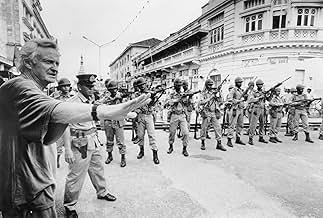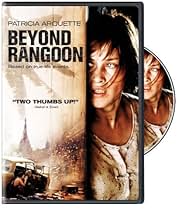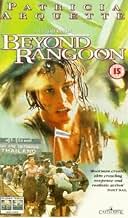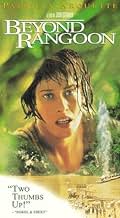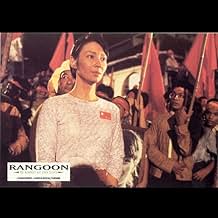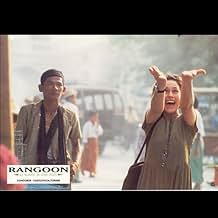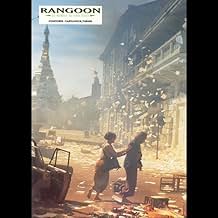NOTE IMDb
6,5/10
5,6 k
MA NOTE
Ajouter une intrigue dans votre langueAn American tourist finds herself in the middle of a political uprising in Burma.An American tourist finds herself in the middle of a political uprising in Burma.An American tourist finds herself in the middle of a political uprising in Burma.
- Réalisation
- Scénario
- Casting principal
- Récompenses
- 2 victoires et 3 nominations au total
Kuswadinata
- Colonel at Hotel
- (as Kuswadinath Bujang)
Avis à la une
10amolad
This is one of the most underrated movies of the 1990s. If you allow yourself to identify with the Patricia Arquette character, you will find it to be a very moving story of a woman regaining a sense of purpose to her life, and finding a new will to live.
Arquette's performance is brave because it is purposefully "wooden" -- it's a way of defining her character's spiritual death, her complete lack of a desire to be alive. She moves through life like a zombie because her family has been murdered and she can't see the point of living. What is moving is how in the course of the story, she is reawakened -- by the Burmese landscape, by the beautiful quality of its people and landscapes, and by the primal choices she is forced to confront.
Boorman supports this visually (and Hans Zimmer supports it with one of his most gorgeous, haunting scores) with an often static camera and with a propensity to shoot through glass, windows, windshields, etc. We are on the outside looking in, just like Arquette.... until she finds herself deep in the jungle and is forced to choose whether or not to fight for her life.
I recommend the 1954 movie THE PURPLE PLAIN as well. It's a similar story in a similar setting, and makes for a fascinating comparison.
Arquette's performance is brave because it is purposefully "wooden" -- it's a way of defining her character's spiritual death, her complete lack of a desire to be alive. She moves through life like a zombie because her family has been murdered and she can't see the point of living. What is moving is how in the course of the story, she is reawakened -- by the Burmese landscape, by the beautiful quality of its people and landscapes, and by the primal choices she is forced to confront.
Boorman supports this visually (and Hans Zimmer supports it with one of his most gorgeous, haunting scores) with an often static camera and with a propensity to shoot through glass, windows, windshields, etc. We are on the outside looking in, just like Arquette.... until she finds herself deep in the jungle and is forced to choose whether or not to fight for her life.
I recommend the 1954 movie THE PURPLE PLAIN as well. It's a similar story in a similar setting, and makes for a fascinating comparison.
When an American tourist comes to Burma with her sister to try and move on from the murder of her husband and son. However a midnight walk brings her into the middle of a student demonstration where she loses her passport. Left behind by her tour group she begins tour of discovery through the troubled country led by U Aung Ko. She discovers a world of atrocities that have not been exposed to the media.
There's no denying that there is a great story here it is a powerful tale of injustice, military rule and massacres that happened away from the public eye. However this film does not really tell that story. Instead it focuses on an American doctor on holiday in Burma who allows us to see all these things. However it comes across like it's about her rather than the country. She is seen as the most important character and we have a subplot about her overcoming the loss of her family in the US. It takes away from the central story and makes this feel like a soap.
Of course it needn't have been like that. It's only a terrible, flat, lifeless performance from Arquette that does this. She is so flat that it's hard to care about her and it comes across even more like a soap. She gives us shock, self-righteous indignation etc all under a monotone voice over than made me want to sleep. She manages to come across as more important than everyone else in the country and it's as she only sees events in terms of how they affect her. Outside of Arquette the support cast are good U Aung Ko in particular, but McDormand and Grey are OK.
The film continues with Hans Zimmer's standard `Far East' score (compare this to Black Rain to see what I mean) and Arquette discovering herself and spuing philosophy everywhere. However at the end the film acts as a metaphor for why the US didn't know about events in Burma because no one cares about massive deaths unless a Westerner is involved. We see in on the news everyday hundreds killed in a third world country is relegated to the end of the news, after a story about what Brittany was wearing that day! But if one American was killed then it would be the lead story with politicians running from all corners to comment on it.
The film manages to take a terrible, emotive story and make it into a beautifully shot drama about one American woman who only sees things in terms of how they affect her. Boorman has a good try but really needed a much better actress to lift the script.
There's no denying that there is a great story here it is a powerful tale of injustice, military rule and massacres that happened away from the public eye. However this film does not really tell that story. Instead it focuses on an American doctor on holiday in Burma who allows us to see all these things. However it comes across like it's about her rather than the country. She is seen as the most important character and we have a subplot about her overcoming the loss of her family in the US. It takes away from the central story and makes this feel like a soap.
Of course it needn't have been like that. It's only a terrible, flat, lifeless performance from Arquette that does this. She is so flat that it's hard to care about her and it comes across even more like a soap. She gives us shock, self-righteous indignation etc all under a monotone voice over than made me want to sleep. She manages to come across as more important than everyone else in the country and it's as she only sees events in terms of how they affect her. Outside of Arquette the support cast are good U Aung Ko in particular, but McDormand and Grey are OK.
The film continues with Hans Zimmer's standard `Far East' score (compare this to Black Rain to see what I mean) and Arquette discovering herself and spuing philosophy everywhere. However at the end the film acts as a metaphor for why the US didn't know about events in Burma because no one cares about massive deaths unless a Westerner is involved. We see in on the news everyday hundreds killed in a third world country is relegated to the end of the news, after a story about what Brittany was wearing that day! But if one American was killed then it would be the lead story with politicians running from all corners to comment on it.
The film manages to take a terrible, emotive story and make it into a beautifully shot drama about one American woman who only sees things in terms of how they affect her. Boorman has a good try but really needed a much better actress to lift the script.
John Boorman, I like your movies. Your movies are cerebral, but do not rely on symbolism or language to convey thought. They seem to rely on emotions, sometimes clichéd (not always a bad thing, and you do handle it well, in that your people say what one would expect a person to really say in that situation, even if it has that feel of a cliché), and lots of water and green vegetation, mud, earth, breath in the cold, dragon's breath, stuff like that.
Your films remind me of David Lean and David Attenborough, which makes sense, but, as you would probably agree, more dreamy.
A possible misgiving is an expectation set up with your stuff that right away tips me in a certain direction, and takes away possible surprise.
Not so with Beyond Rangoon, which I found was beyond the others you have done that I am most familiar with (Emerald Forest, which I need to see again, and Excalibur).
Beyond Rangoon is the story of one woman set against the backdrop of events in Myanmar (Burma). The story makes no attempt to give us a comprehensive picture of those events, just an introduction, but it is a solid introduction. I feel I know a lot more, and I have a sense of connection with those people that I did not have before, however tenuous from my place of privilege.
Overall I found the story moving and filled with meaning. I always like Patricia Arquette, and her leading man in this film is just great. Actually, she's the lead in this film, and that is what is great.
So much of the film is told with film language, that is, images, that I can see some critics being a little impatient with it, but it is probably because they overanalyze and find it fearful to feel anything too deeply.
Anyone out there wondering if this movie is worth it should watch it to find out. It will not be a waste of your time, whether you like it or not.
Your films remind me of David Lean and David Attenborough, which makes sense, but, as you would probably agree, more dreamy.
A possible misgiving is an expectation set up with your stuff that right away tips me in a certain direction, and takes away possible surprise.
Not so with Beyond Rangoon, which I found was beyond the others you have done that I am most familiar with (Emerald Forest, which I need to see again, and Excalibur).
Beyond Rangoon is the story of one woman set against the backdrop of events in Myanmar (Burma). The story makes no attempt to give us a comprehensive picture of those events, just an introduction, but it is a solid introduction. I feel I know a lot more, and I have a sense of connection with those people that I did not have before, however tenuous from my place of privilege.
Overall I found the story moving and filled with meaning. I always like Patricia Arquette, and her leading man in this film is just great. Actually, she's the lead in this film, and that is what is great.
So much of the film is told with film language, that is, images, that I can see some critics being a little impatient with it, but it is probably because they overanalyze and find it fearful to feel anything too deeply.
Anyone out there wondering if this movie is worth it should watch it to find out. It will not be a waste of your time, whether you like it or not.
In the 90's, the American doctor Laura Bowman (Patricia Arquette) travels to Burma (presently Myanmar) with her sister and also doctor Andy Bowman (Frances McDormand) to recover from the loss of her beloved husband and son that were murdered in a theft at home. Laura sees a political pro-democracy manifestation to support the leader Aung San Suu Kyi and she decides to participate; however she loses her passport and she is not allowed to leave Rangoon.
While waiting to have another flight, Laura meets the unofficial tourist guide U Aung Ko, who is also a leader of an underground movement, and she decides to visit the countryside of Burma. However, the military dictatorship represses the movement and Laura, U Aung Ko and several civilians try to escape to Thailand in a dangerous journey.
"Beyond Rangoon" is an underrated film that has not aged, with top-notch performance of the gorgeous Patricia Arquette, I saw this film twice on VHS in the 90's and it is amazing that the military dictatorship still does exist in this country.
In accordance with the statement of John Boorman in the Extras of the DVD, the dramatic scene when the commander orders to shoot the politician Aung San Suu Kyi did really happen. Aung San Suu Kyi won the 1991 Nobel Peace Prize and shamefully was only released from house arrest on 13 November 2010. My vote is eight.
Title (Brazil): "Muito Além de Rangum" ("Far Beyond Rangoon")
While waiting to have another flight, Laura meets the unofficial tourist guide U Aung Ko, who is also a leader of an underground movement, and she decides to visit the countryside of Burma. However, the military dictatorship represses the movement and Laura, U Aung Ko and several civilians try to escape to Thailand in a dangerous journey.
"Beyond Rangoon" is an underrated film that has not aged, with top-notch performance of the gorgeous Patricia Arquette, I saw this film twice on VHS in the 90's and it is amazing that the military dictatorship still does exist in this country.
In accordance with the statement of John Boorman in the Extras of the DVD, the dramatic scene when the commander orders to shoot the politician Aung San Suu Kyi did really happen. Aung San Suu Kyi won the 1991 Nobel Peace Prize and shamefully was only released from house arrest on 13 November 2010. My vote is eight.
Title (Brazil): "Muito Além de Rangum" ("Far Beyond Rangoon")
10Tigre-2
Never had I seen such a powerful true story movie. I discovered a city, a country, a lost revolution and even a Nobel prize winner thanks to this masterpiece of cinema.
If you haven't seen this movie, you can't say you've seen anything .
A great lesson of courage, humility and life.
I haven't seen anything as good since.
T.E. Saturday, January 9th, 1999
If you haven't seen this movie, you can't say you've seen anything .
A great lesson of courage, humility and life.
I haven't seen anything as good since.
T.E. Saturday, January 9th, 1999
Le saviez-vous
- AnecdotesSpalding Gray had previously been in another film about a South East Asian conflict: "The Killing Fields" (1984), which documented the genocide from the Khmer Rouge in Cambodia.
- GaffesWhen Patricia Arquette arrives at the railroad station, a train is standing on the track nearest the platform. When she runs to get on the train, it is just pulling in to the station.
Meilleurs choix
Connectez-vous pour évaluer et suivre la liste de favoris afin de recevoir des recommandations personnalisées
- How long is Beyond Rangoon?Alimenté par Alexa
Détails
Box-office
- Budget
- 23 000 000 $US (estimé)
- Montant brut aux États-Unis et au Canada
- 5 750 110 $US
- Week-end de sortie aux États-Unis et au Canada
- 2 007 527 $US
- 27 août 1995
- Montant brut mondial
- 5 750 110 $US
- Durée
- 1h 40min(100 min)
- Couleur
- Mixage
- Rapport de forme
- 2.39 : 1
Contribuer à cette page
Suggérer une modification ou ajouter du contenu manquant


